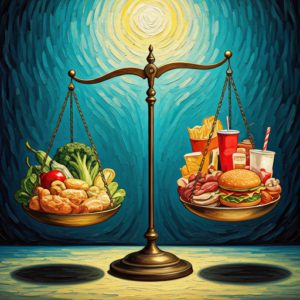 The human brain is an incredible organ, weighing about 2% of your total body weight yet consuming up to 20% of your energy. But have you ever wondered how the foods you eat influence this powerhouse? If we broke down the brain into its nutritional components, it would reveal fascinating insights into how different nutrients impact its functioning, mood, energy, and development. Here’s a closer look at the relationship between your brain and the food on your plate.
The human brain is an incredible organ, weighing about 2% of your total body weight yet consuming up to 20% of your energy. But have you ever wondered how the foods you eat influence this powerhouse? If we broke down the brain into its nutritional components, it would reveal fascinating insights into how different nutrients impact its functioning, mood, energy, and development. Here’s a closer look at the relationship between your brain and the food on your plate.
The Building Blocks of the Brain
If you were to remove all the moisture from your brain and analyse its contents, you’d find it is primarily made of fats, followed by proteins, amino acids, micronutrients, and glucose. Each of these components plays a vital role:
- Fats: The brain’s structure and functionality rely heavily on fats, particularly omega-3 and omega-6 fatty acids. These essential fats, found in foods like nuts, seeds, and fatty fish, are critical for building and maintaining cell membranes. They also protect the brain from degenerative diseases. However, not all fats are beneficial; trans and saturated fats can harm brain health over time.
- Proteins and Amino Acids: Proteins are composed of amino acids, which serve as precursors to neurotransmitters—chemical messengers that regulate mood, sleep, and cognition. For example, the calming effect of a carb-heavy meal or the alertness following a protein-rich snack is due to these neurotransmitters, including dopamine, serotonin, and norepinephrine.
- Micronutrients: Vitamins like B6, B12, and folic acid, along with minerals like iron, zinc, copper, and sodium, play crucial roles in preventing mental decline and supporting cognitive development. Antioxidants found in fruits and vegetables combat free radicals, which can damage brain cells, helping your brain stay sharp for longer.
- Glucose: Carbohydrates are the brain’s main source of fuel, converted into glucose, or blood sugar, during digestion. The brain’s energy demands are so high that any disruption in glucose supply can quickly affect mental function, causing mood changes or reduced attentiveness.
How Food Impacts Brain Function
Your daily food choices don’t just satisfy hunger—they have a direct, long-lasting effect on your brain’s performance. Here’s how key nutrients affect mental function:
- Essential Fats: A diet rich in omega-3 and omega-6 fats is associated with better brain health and reduced risks of cognitive decline. Incorporating foods like salmon, walnuts, and flaxseeds into your meals can significantly improve brain function over time.
- Balanced Amino Acids: Amino acids from proteins compete for access to the brain, meaning a diverse diet helps maintain balanced neurotransmitter levels. This balance prevents extreme mood swings and ensures optimal mental performance.
- Steady Glucose Levels: Not all carbohydrates are created equal. High glycemic foods, such as white bread, cause a rapid spike in blood sugar followed by a crash, leading to reduced attention span and irritability. Complex carbs found in oats, grains, and legumes release glucose slowly, promoting sustained energy and focus.
Why a Varied Diet Matters
The brain thrives on variety. A diverse diet ensures that your brain gets a steady supply of all essential nutrients, preventing deficiencies and supporting overall health. Foods rich in antioxidants, healthy fats, proteins, and complex carbohydrates work together to optimize brain function.
For example:
- Breakfast: Start your day with oats topped with nuts and seeds for slow-releasing energy.
- Lunch: A protein-packed salad with grilled salmon and leafy greens can boost neurotransmitter production.
- Dinner: Whole grains with a side of colourful vegetables provide the micronutrients your brain needs to combat stress and fatigue.
Food for Thought
Every bite you take affects the most powerful organ in your body. Choosing nutrient-rich foods over processed, sugary options can lead to improved focus, better mood, and long-term brain health. By understanding the link between diet and mental performance, you can make smarter choices to fuel your brain and unlock your full potential.
So next time you plan a meal, remember—you’re not just feeding your body; you’re feeding your brain. 🌱
Source: TED-ed
